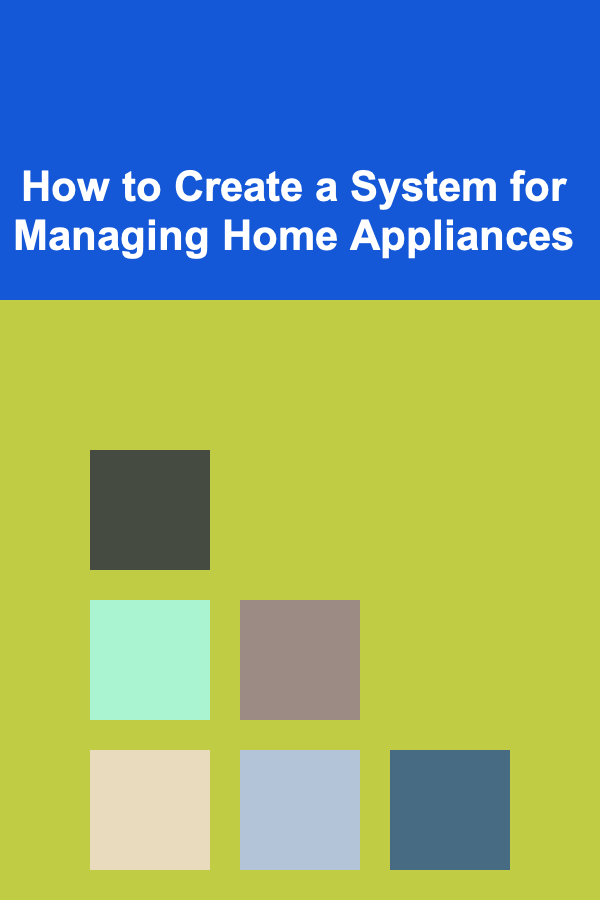
How to Create a System for Managing Home Appliances
ebook include PDF & Audio bundle (Micro Guide)
$12.99$10.99
Limited Time Offer! Order within the next:

Managing home appliances effectively is essential for maintaining a comfortable, efficient, and functional household. As technology continues to evolve, our homes are filled with an increasing number of devices designed to make our lives easier---from refrigerators and washing machines to smart thermostats and home assistants. However, without proper organization and management, these appliances can quickly become overwhelming. This comprehensive guide will walk you through the steps needed to create a system for managing your home appliances efficiently.
Understanding the Importance of Appliance Management
1. Efficiency and Productivity
An organized approach to managing appliances ensures that they function smoothly, which saves time and effort in the long run. Proper management means that you'll spend less time troubleshooting issues or searching for appliance manuals.
2. Cost Savings
Regular maintenance extends the lifespan of your appliances and prevents costly repairs. By being proactive about maintenance and usage, you reduce energy consumption and repair bills, ultimately saving money.
3. Safety Concerns
Appliances can pose safety risks if not managed properly. Regular checks can help identify potential hazards---like frayed cords or gas leaks---before they escalate into serious problems.
4. Enhanced Convenience
A well-managed home makes daily tasks more convenient. Knowing how to operate and maintain appliances without hassle allows you to focus on other areas of your life.
5. Environmental Impact
Efficiently managed appliances consume less energy, thereby reducing your carbon footprint. This contributes to a more sustainable lifestyle and can enhance your home's overall efficiency.
Inventorying Your Home Appliances
The first step in creating a management system for your appliances is to inventory them. This process involves listing all the appliances you own and gathering essential information about each one.
1. Create an Inventory List
Start by making a comprehensive list of all your home appliances, including:
- Kitchen Appliances: Refrigerators, ovens, microwaves, dishwashers, blenders, etc.
- Laundry Appliances: Washing machines, dryers, irons, etc.
- Cleaning Appliances: Vacuum cleaners, steam mops, etc.
- Heating and Cooling Appliances: Heaters, air conditioners, ceiling fans, etc.
- Miscellaneous Appliances: TVs, game consoles, coffee makers, water purifiers, etc.
2. Collect Essential Information
For each appliance, gather important details such as:
- Brand and model number
- Purchase date
- Warranty information
- Maintenance needs
- Energy consumption ratings
- User manuals (digital or physical copies)
3. Use Technology Tools
Consider utilizing inventory management software or mobile apps specifically designed for home inventory. These tools can streamline the process and allow for easy updates as you acquire or dispose of appliances.
Categorizing Your Appliances
Once you have a comprehensive inventory, categorizing your appliances will help you manage them more effectively. Grouping similar appliances together will facilitate tracking maintenance schedules and understanding usage.
1. Common Categories
Here are some suggested categories for organizing your appliances:
- Major Appliances: Large appliances like refrigerators, ovens, and washers.
- Small Appliances: Countertop appliances such as mixers, coffee makers, and toasters.
- Seasonal Appliances: Devices used only during specific seasons, like heaters or air conditioners.
- Smart Appliances: Connected devices that can be controlled via smartphone or smart home systems.
2. Create Subcategories
Within each main category, consider subcategories based on functionality or purpose, such as:
- Cooking Appliances: Ovens, microwaves, slow cookers.
- Cleaning Appliances: Washers, dryers, vacuums, steam cleaners.
- Home Entertainment: TVs, sound systems, gaming consoles.
3. Labeling Systems
Use labels to clearly mark different categories and subcategories in your appliance management system. This can involve physical labels on storage areas or digital tags within inventory management software.
Creating a Maintenance Schedule
A critical aspect of managing home appliances is developing a maintenance schedule. Regular servicing and cleaning will keep appliances running optimally and extend their lifespan.
1. Identify Maintenance Needs
Review each appliance's user manual for recommended maintenance tasks. Common maintenance activities include:
- Cleaning Filters: Range hoods, HVAC systems, and refrigerator filters often require regular cleaning to function efficiently.
- Checking Connections: Inspect hoses, electrical connections, and plugs for wear and tear.
- Calibrating Settings: Some devices may need recalibration periodically for optimal performance.
2. Establish Frequency of Tasks
Determine how often each maintenance task should be performed:
- Weekly: Cleaning surfaces of kitchen appliances, emptying vacuum cleaner bins.
- Monthly: Checking smoke detector batteries, cleaning refrigerator coils.
- Quarterly: Inspecting washer hoses, cleaning AC filters.
- Annually: Servicing major appliances, such as HVAC systems and water heaters.
3. Document the Schedule
Create a visual maintenance calendar that includes all scheduled tasks. This can be a physical wall calendar, a digital calendar, or an app designed for reminders.
4. Set Reminders
Utilize alarms or notifications through your calendar or task management apps to remind you when maintenance tasks are due. Setting reminders ahead of time can prevent last-minute scrambles.
Tracking Warranty and Service Information
Keeping track of warranty and service information is crucial for effective appliance management. This helps avoid unnecessary expenses and ensures that you leverage warranties fully.
1. Document Warranty Details
For each appliance, note the following warranty information:
- Warranty Period: The duration of the warranty coverage.
- Coverage Details: What aspects are covered, such as parts, labor, or both.
- Claim Process: Instructions on how to file a claim, including contact information for customer service.
2. Organize Service Records
Maintain records of any professional services performed on your appliances, including:
- Dates of service
- Nature of service (repair, maintenance, installation)
- Costs incurred
- Service provider contact information
3. Use Digital Solutions
Consider using apps or software designed for managing warranties and service records. Many offer features that allow you to easily access information, set reminders for expiration dates, and store receipts digitally.
4. Create a Centralized File
If you prefer a physical method, create a centralized binder or folder containing all warranty documents, service records, and user manuals. Organize it by appliance type for quick reference.
Implementing Smart Technology Solutions
Smart technology can significantly enhance your ability to manage home appliances effectively. Here's how to incorporate smart solutions into your management system:
1. Smart Home Hubs
Consider investing in a smart home hub that integrates with various appliances. Brands like Google Nest, Amazon Alexa, or Apple HomeKit can centralize control for smart appliances and provide valuable insights.
2. Smart Plugs and Switches
Smart plugs can help monitor energy consumption and usage patterns. With these devices, you can track usage times and automate schedules to optimize energy efficiency.
3. Mobile Apps for Appliances
Many modern appliances come with companion mobile apps that offer features such as remote control, usage tracking, and maintenance alerts. Download and utilize these apps for tailored management of each device.
4. Energy Monitoring Systems
Consider installing energy monitoring systems that provide real-time data on appliance energy consumption. These insights can help you identify inefficient appliances and inform decisions about replacements or upgrades.
Establishing an Appliance Usage Guide
A comprehensive usage guide for your appliances can enhance their efficiency and reduce misuse. This guide should cover operational instructions, best practices, and tips for maximizing performance.
1. Create Operational Manuals
For each appliance, develop a clear and concise manual that outlines:
- Basic Operations: Step-by-step instructions for use.
- Settings and Features: Description of various settings and options available.
- Troubleshooting Tips: Common issues and solutions for repairs.
- Best Practices: Recommended usage habits to ensure longevity and efficiency.
2. Educate Family Members
Share the usage guide with all family members who interact with the appliances. Familiarizing everyone with their operation promotes consistent and safe usage.
3. Update Regularly
As appliances undergo updates or changes---whether through software upgrades or new features---be sure to update the usage guide accordingly. Regular reviews of the guide will keep it relevant and useful.
Tips for Sustainable Appliance Management
Sustainability plays a crucial role in modern appliance management. These tips can help you adopt greener practices:
1. Use Energy-Efficient Appliances
When replacing old appliances, look for ENERGY STAR certified models. These appliances consume less energy and water, reducing your environmental impact and utility costs.
2. Practice Smart Usage Habits
Encourage energy-saving habits, such as:
- Running dishwashers and washing machines only with full loads.
- Utilizing energy-saving modes on appliances when available.
- Turning off appliances when not in use.
3. Recycling Old Appliances
When disposing of old appliances, research recycling programs or donation centers to keep items out of landfills. Many manufacturers also offer take-back programs.
4. Conduct Energy Audits
Perform regular energy audits of your home to assess where improvements can be made. Identify appliances that consume excessive energy and consider upgrading or modifying their use.
5. Utilize Eco-Friendly Products
When cleaning and maintaining your appliances, opt for eco-friendly cleaning products. These minimize harmful chemical exposure and contribute to a healthier indoor environment.
Conclusion
Creating a system for managing home appliances is essential for achieving an efficient, safe, and environmentally responsible household. By taking the time to inventory your appliances, categorize them, establish maintenance schedules, and leverage technology, you can streamline operations and enhance the overall functionality of your home.
Additionally, integrating sustainable practices into your appliance management routine will benefit both your household and the planet. As you implement these strategies, you'll enjoy the convenience of well-maintained appliances while contributing to a healthier living environment.
By following this comprehensive guide, you are well-equipped to develop an effective system for managing your home appliances, ensuring they serve you well for years to come. Embrace ongoing learning and adjustment, as the world of home technology continues to evolve, and stay proactive in your appliance management practices for a seamless home experience.

How to Maintain Your Home's Air Quality with Regular Checks
Read More
How to Make Money Online as a Grant Writer: 10 Actionable Ideas
Read More
How to Start an Online Store and Make Sales from Home
Read More
How to Work as a Travel Nurse or Other Traveling Professionals
Read More
The Operations Director's Guide: Strategies for Streamlining Business Operations
Read More
How To Identify and Avoid Tech Support Scams
Read MoreOther Products

How to Maintain Your Home's Air Quality with Regular Checks
Read More
How to Make Money Online as a Grant Writer: 10 Actionable Ideas
Read More
How to Start an Online Store and Make Sales from Home
Read More
How to Work as a Travel Nurse or Other Traveling Professionals
Read More
The Operations Director's Guide: Strategies for Streamlining Business Operations
Read More